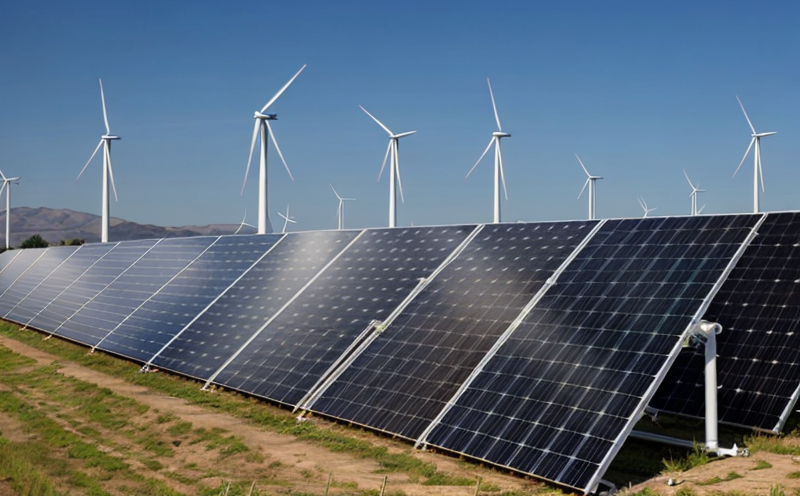IEC 60034 Generator Safety and Reliability Testing
The International Electrotechnical Commission (IEC) standard IEC 60034 is a globally recognized framework that sets out the essential requirements for the safety, performance, and reliability of electrical machines. This service focuses on generator testing to ensure compliance with these standards. Generators play a crucial role in renewable energy systems by converting mechanical energy into electrical power.
Testing according to IEC 60034 is mandatory for generators used in critical applications such as wind turbines, hydroelectric plants, and other renewable energy sources. The tests are designed to evaluate the generator's ability to withstand operational stresses without compromising safety or performance. This includes evaluating insulation resistance, mechanical strength, thermal stability, electromagnetic compatibility (EMC), and more.
The testing process involves subjecting the generator to various stress conditions that simulate real-world operating environments. These tests are critical for ensuring the reliability of renewable energy systems, which contribute significantly to global sustainability efforts. Compliance with IEC 60034 not only ensures safety but also enhances the reputation and marketability of a company's products.
Our laboratory uses cutting-edge equipment and follows rigorous procedures to ensure accurate and reliable test results. The testing process typically includes:
- Insulation Resistance Testing: This test checks the generator’s ability to withstand electrical stresses without causing insulation breakdown.
- Mechanical Stress Testing: This involves subjecting the generator to mechanical loads that simulate operational conditions to ensure structural integrity.
- Temperature Rise and Heat Dissipation Tests: These tests assess how effectively the generator can dissipate heat, which is crucial for preventing overheating.
- EMC Testing: This evaluates the generator’s ability to function correctly in electromagnetic environments without causing interference or being affected by external electromagnetic fields.
The results of these tests are detailed and comprehensive. They provide a clear picture of the generator's compliance with IEC 60034 standards, highlighting any areas that may require improvement. Our team works closely with clients to ensure that all test requirements are met and that the final report is actionable.
By adhering to these stringent testing protocols, we help our clients achieve regulatory compliance, enhance product reliability, and demonstrate a commitment to safety and sustainability in renewable energy systems.
Why It Matters
The importance of IEC 60034 generator testing cannot be overstated. Compliance with these standards ensures the safe and reliable operation of generators, which are integral components in renewable energy systems. The tests help identify potential issues early in the development process, preventing costly failures later on.
For quality managers and compliance officers, ensuring that products meet international standards is paramount. IEC 60034 testing provides a benchmark for safety and reliability, which is essential for maintaining trust with customers and regulators alike. R&D engineers benefit from the detailed insights provided by these tests, helping them refine designs and improve performance.
From a sustainability perspective, reliable generators are crucial for maximizing the efficiency of renewable energy systems. By ensuring that every component operates flawlessly, we contribute to reducing waste and enhancing overall system reliability. This, in turn, leads to greater adoption of clean energy solutions worldwide.
Why Choose This Test
Choosing IEC 60034 generator testing for your renewable energy systems offers several advantages:
- Global Recognition: Compliance with this standard is recognized worldwide, ensuring that your products meet the highest international standards.
- Safety Assurance: The tests ensure that all components operate safely under various conditions, reducing the risk of accidents or failures.
- Reliability Enhancement: By identifying and addressing potential weaknesses early in the development process, you can enhance the overall reliability of your products.
- Market Advantage: Demonstrating compliance with these standards enhances your company’s reputation and marketability, making it easier to enter new markets or expand existing ones.
In addition to these benefits, our laboratory offers a range of services that complement IEC 60034 testing. These include:
- Customized Testing Programs: We work closely with clients to develop tailored testing programs that meet specific project requirements.
- Comprehensive Reporting: Our detailed reports provide a clear and concise overview of the test results, making it easier for stakeholders to understand the findings.
- Training and Consultation: We offer training sessions and consultation services to help clients better understand the testing process and its implications.
Environmental and Sustainability Contributions
The focus on generator safety and reliability through IEC 60034 testing plays a crucial role in supporting environmental sustainability. Reliable generators ensure that renewable energy systems operate efficiently, maximizing the conversion of natural resources into usable electricity. This not only reduces waste but also helps to minimize the carbon footprint associated with energy production.
By ensuring that every component of your renewable energy system meets the highest standards for safety and reliability, you contribute to a more sustainable future. Our laboratory’s commitment to environmental responsibility is reflected in our testing protocols, which are designed to minimize waste and reduce energy consumption during the testing process itself.
Moreover, by fostering innovation and improving product quality through rigorous testing, we help pave the way for more efficient and environmentally friendly renewable energy solutions. This aligns with broader global efforts to transition towards cleaner forms of energy production.





